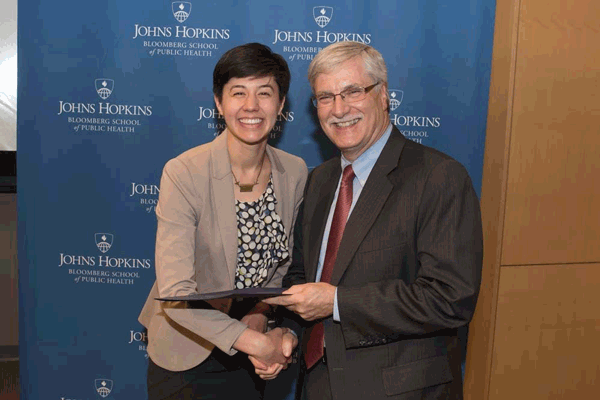Marie Spiker, MSPH '14, RD program
PHD STUDENT, HUMAN NUTRITION

Marie Spiker is a graduate of the Department's MSPH/Registered Dietician Program and is currently a doctoral student in the Department's Program in Human Nutrition.
Why did you choose the MSPH/RD Program at Hopkins
I came to the Bloomberg School because I wanted a strong methodological foundation for a career that bridges research and practice. After finishing my MSPH, I felt that I had gained an extraordinary amount of training and experience.
My time at Hopkins has transformed the way I view tough problems. In public health we deal with a lot of gloomy situations and seemingly unsolvable problems, but I've been exposed to so many innovative, hard working, and compassionate people at the Bloomberg School that I can't help but feel a sense of optimism.
Any advice to students considering the master's or doctoral program in Human Nutrition?
If your interests span multiple departments or disciplines, don't worry! Some of my best experiences have come from collaborations with other program areas and departments at Johns Hopkins.
What did you do for your required practicum?
For my MSPH/RD practicum, I completed 6 months of clinical dietetic training at the Bayview Medical Center and spent 2 months interning for the city's Food Policy Director at the Baltimore Food Policy Initiative. For one of my projects, I helped public market vendors develop healthier options for kids. This involved balancing the interests of vendors, municipal stakeholders invested in the public market, and academics who study purchasing behaviors in urban food environments.
What are you working on now?
My main research focus is the intersection of human nutrition and food systems, which requires a multi-disciplinary approach and systems thinking. At Johns Hopkins I have researched household food security, food waste, urban agriculture, and menu labeling policies.
What's your doctoral dissertation topic?
Increasing the availability of healthy foods in low- and middle-income countries by using systems thinking to model agricultural supply chains.
What do you want to do after you graduate?
I look to faculty members in this department as an example of how to participate actively in the public and private sector, at levels ranging from local to global, while still advancing what we know about public health. After graduation, I see myself holding roles in both the academic world and the world of applied public health.
